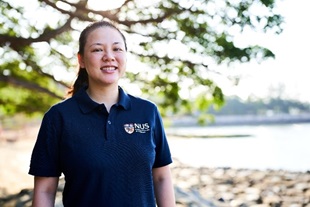Some of our new Editorial Board Members talk about their research and their reasons for joining the journal.

Biology Letters is delighted to welcome several new Editorial Board Members onto our Editorial Board. In this new post they tell us a bit about themselves and their research…
Matina Donaldson-Matasci
I am an Assistant Professor in the Biology Department at Harvey Mudd College, a small liberal arts college that focuses on science, math and engineering. My work centers on communication and collective behavior in social insects, particularly honey bees and turtle ants. I'm fascinated by the capabilities of these tiny insects, and how individuals with only limited, local information are able to work together to find and exploit resources within a complex environment. I use a variety of methods, including mathematical and computational models, laboratory experiments with ants, and field experiments with bees. I am also exploring remote sensing approaches, using computer vision and machine learning to collect behavioral data from videos of ants and bees and to construct and describe models of the environments they are interacting with.
Biology Department at Harvey Mudd College, a small liberal arts college that focuses on science, math and engineering. My work centers on communication and collective behavior in social insects, particularly honey bees and turtle ants. I'm fascinated by the capabilities of these tiny insects, and how individuals with only limited, local information are able to work together to find and exploit resources within a complex environment. I use a variety of methods, including mathematical and computational models, laboratory experiments with ants, and field experiments with bees. I am also exploring remote sensing approaches, using computer vision and machine learning to collect behavioral data from videos of ants and bees and to construct and describe models of the environments they are interacting with.
I'm excited to join the Board of Biology Letters, and to contribute to shaping the journal's growth in the areas of behavior and ecology. I'm particularly interested in cross-disciplinary science and how methods from computer science, mathematics and engineering—combined with more traditional observational and experimental methods in biology—can give us insight into biological questions. I'm looking forward to reading some top-notch new science, and to being a part of communicating that work effectively with the scientific community.
Anne Leonard
I study the behavioral drivers of plant-pollinator interactions, applying insights from cognitive and nutritional ecology to understand bee foraging decisions and floral traits. Some of this work draws on my background in sensory biology and animal communication—for example, I have developed and tested hypotheses addressing the function of multimodal floral displays and explored multisensory integration in bees. My recent work explores how chemically complex floral rewards structure interactions between plants, their pollinators, and their co-flowering competitors. I am also motivated to understand how human activities alter these interactions, with a special interest in how agrochemicals affect the sensory systems, behavior, and health of native bees.
plant-pollinator interactions, applying insights from cognitive and nutritional ecology to understand bee foraging decisions and floral traits. Some of this work draws on my background in sensory biology and animal communication—for example, I have developed and tested hypotheses addressing the function of multimodal floral displays and explored multisensory integration in bees. My recent work explores how chemically complex floral rewards structure interactions between plants, their pollinators, and their co-flowering competitors. I am also motivated to understand how human activities alter these interactions, with a special interest in how agrochemicals affect the sensory systems, behavior, and health of native bees.
I am an Associate Professor in the Biology Department of the University of Nevada, Reno, and pleased to be joining the Biology Letters editorial board, as this journal has been home to some of my favorite publications. As an author, I enjoy the challenge of describing a project concisely in the Letters format and distilling its key messages; in my new role, I look forward to helping authors share their exciting results with a broader community.
Mei Lin Neo
Greetings! I am a Senior Research Fellow in the Tropical Marine Science Institute at the National University of Singapore. As a trained marine ecologist, I have broad research interests that examine the interactions of marine organisms with the environment, as well as how environmental changes (such as temperature, ocean acidification, and marine plastic pollution) can affect the ecophysiology of marine organisms. Much of my work focuses mainly on using marine invertebrates as model experimental organisms, with a particular interest on the molluscs. My current research centers on understanding the influence of human activities on the marine environment and its biodiversity via a multi-disciplinary approach. This includes approaches such as experimental ecology, biodiversity surveys, phylogeography, taxonomy and systematics, marine law and policy, and science communication to provide a holistic perspective on marine conservation issues.
in the Tropical Marine Science Institute at the National University of Singapore. As a trained marine ecologist, I have broad research interests that examine the interactions of marine organisms with the environment, as well as how environmental changes (such as temperature, ocean acidification, and marine plastic pollution) can affect the ecophysiology of marine organisms. Much of my work focuses mainly on using marine invertebrates as model experimental organisms, with a particular interest on the molluscs. My current research centers on understanding the influence of human activities on the marine environment and its biodiversity via a multi-disciplinary approach. This includes approaches such as experimental ecology, biodiversity surveys, phylogeography, taxonomy and systematics, marine law and policy, and science communication to provide a holistic perspective on marine conservation issues.
I am especially delighted to join the Editorial Board of Biology Letters! This honour will give me the opportunity to curate forthcoming research in the field of marine science, as well as to give spotlight to understudied and underappreciated marine organisms. I am also keen to explore how to improve science communication in the community, so that the good research published in the journal has a greater outreach and impact.
Julia Nowack
I am excited to be joining the Biology Letters Editorial Board, which is one of my favourite science journals!
My own research lies in the field of eco-physiology, focussing on energetics and thermoregulation of mammals. I currently hold a position as a Senior Lecturer at Liverpool John Moores University in the UK but have started my research career by working on bats in the Costa Rican rainforest, small primates in the South African bush and studying the unique fauna of Australian mammals, before returning to European species of all sizes.
In my research, I am particularly fascinated by the ability of certain species to enter torpor, a powerful energy saving mechanism which enables certain species of mammals and birds to reduce energy demands and to outlast climatic challenges and/or energetic bottlenecks. Further, I am a firm believer of the importance to study species in the field as many species only show their full physiological breath in their natural environment. I am thus particularly eager to see submissions to Biology Letters tackling exciting questions in evolutionary ecology and eco-physiology through field studies or a combination of field work and laboratory experiments. I am looking forward to playing a small role in getting many exciting studies published.
Robin Thompson
I am an Assistant Professor of Mathematical Epidemiology at the University of Warwick, UK. My research focuses on developing mathematical models for guiding public health measures during infectious disease epidemics. This involves creating stochastic and deterministic modelling approaches, and parameterising the models using statistical parameter inference techniques. I then use the models to test different potential control interventions. The main aim is not only to inform interventions during specific epidemics, but also to understand epidemic dynamics more generally so that interventions can be planned in a wide range of scenarios.
developing mathematical models for guiding public health measures during infectious disease epidemics. This involves creating stochastic and deterministic modelling approaches, and parameterising the models using statistical parameter inference techniques. I then use the models to test different potential control interventions. The main aim is not only to inform interventions during specific epidemics, but also to understand epidemic dynamics more generally so that interventions can be planned in a wide range of scenarios.
I am honoured to be invited to join the Biology Letters editorial board. I have enjoyed publishing in Royal Society journals, and the opportunity to promote innovative and high impact research is exciting. By undertaking this role, I hope to make a helpful contribution to the wider research community.
Photo Credits
Cover Image - Photo by Rodion Kutsaev on Unsplash
Board member photographs kindly provided by the subjects.
